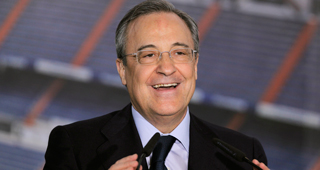It’s been whispered in Spain for years that if Florentino Pérez could ever refine his taste in transfers, Real Madrid would be unbeatable. Arguably the biggest and certainly one of the richest clubs in the world, Madrid have, through two eras with Pérez in charge (2000 to 2006 and 2009 until now), won domestic and European trophies both because of and in spite of their president’s propensity for signing name-brands and award-winners. On the one hand, Madrid hardly ever sign a player who isn’t really, really good, but on the other, there’s not a lot of attention paid to how that player might fit into the existing team, and he almost always arrives at a premium.
A few weeks ago, there was a story in the Spanish sports tabloids about Madrid circling Kaká back in 2002, when he was still playing in Brazil with São Paulo and hadn’t yet written so much as a line of prose in Milan’s history books. One of Madrid’s directors was telling Pérez Flo, we can get the kid for $14 million this summer. He’s going to be worth $70 million a few years from now. Pérez looked at his colleague and said don’t you worry; we’ll buy him once he costs 70.
Pérez delivered on his promise, and there’s a kind of intelligence to waiting for a player to become the star the prognosticators are making him out to be before you bring him into an intensely competitive squad like Real Madrid has, but Pérez also got the Kaká deal wrong, shelling out $77 million for a player who was slightly past his peak and on the verge of a further decline due to persistent leg injuries. He did something similar with Zinedine Zidane in 2001, paying what was then a world record fee for a twenty-nine-year-old. Zidane went on to win a Champions League and a Liga title during his three years in Madrid, but acquiring him wasn’t, strictly speaking, a brilliant piece of business.
If that sentiment reads knottily, it’s because Madrid’s transfer policy will have you talking out of sides of your mouth you didn’t even know existed. They occasionally make dumb, exceedingly pricey signings, but they’re rich enough to make big mistakes and still compete for trophies. They sign the most obvious players, but those players are obvious because they’re awesome. They have little concern for balance or coherence, but out-talenting opponents is, it turns out, a viable strategy. Real Madrid’s approach to team-building isn’t elegant, and it’s subtle like a stretch Hummer, but it works.
Or it has worked well enough. Madrid’s Liga triumph last season was their first in five years and second in nine. They’ve won three of the last four Champions Leagues, but before that they had only won a single European title since the millennium turned over. While this isn’t a bad return by any stretch, Madrid’s trophy haul under Pérez has been—by the mesosphere-high standards of the club— unimpressive until recently. It’s no coincidence that the club’s uptick has coincided with Uncle Flo mildly reforming his appetites. Since breaking the bank for Cristiano Ronaldo in 2009, Madrid have bought two luxury players in Gareth Bale and James Rodriguez. The former has worked out reasonably well, if not quite living up to his price tag, and the latter more or less flopped, moving on to Bayern Munich this summer, but beyond those two obscene bits of cash-splashing, Pérez has mostly brought aboard relatively cost-effective, excellently skilled players like Luka Modrić, Toni Kroos, and Isco, and he has kept those signings around, giving the the team a strong spine of players who are used to playing together. This summer, Madrid have been cash-positive in the transfer market, selling off Álvaro Morata, James, and Danilo and bringing aboard young, talented depth in Dani Ceballos and Theo Hernández.
Of course, Pérez’s prudence has its limits. Madrid have also spent $53 million on a Brazilian sixteen-year-old named Vinícius Júnior, which feels like Flo still being angry that Neymar picked Barcelona over Real Madrid four summers ago and paying an absurd sum to make sure he doesn’t miss out on Neymar Mk. II. And there’s still a possibility Madrid will pay something like $200 million for Kylian Mbappé despite the teenaged Frenchman having had exactly half of a great season at Monaco and the fact that Madrid’s front line doesn’t have any open slots at the moment, at least not unless Ronaldo can be persuaded to play as an actual striker instead of a de facto one. Pérez is addicted to status and glitz. He can manage his impulses, but they’re never going to go away completely.
No matter; all it has taken to turn Madrid into a juggernaut is Pérez listening a little bit more to his scouts and a little bit less to his champagne-pumping heart. He was already working with a sizable margin for error, and now he’s screwing up less than he ever has. If you’re starry-eyed and naive and believe in whatever god spoke through Johan Cruyff and Sócrates—or if you just think the world’s billionaires should all be in prison—you might see Madrid as always threatening to crater, on the brink of some cosmic comeuppance for the tackiness of their talent-poaching and their blithe lack of concern for aesthetics and sustainability. That collapse has never come, and it probably never will, but it certainly won’t arrive if Pérez has truly smartened up. His profligacy and insistence on starpower over substance have been all that’s been holding the club back. Real Madrid with their president’s head on straight: that’s every non-Madridista worst fears realized.



